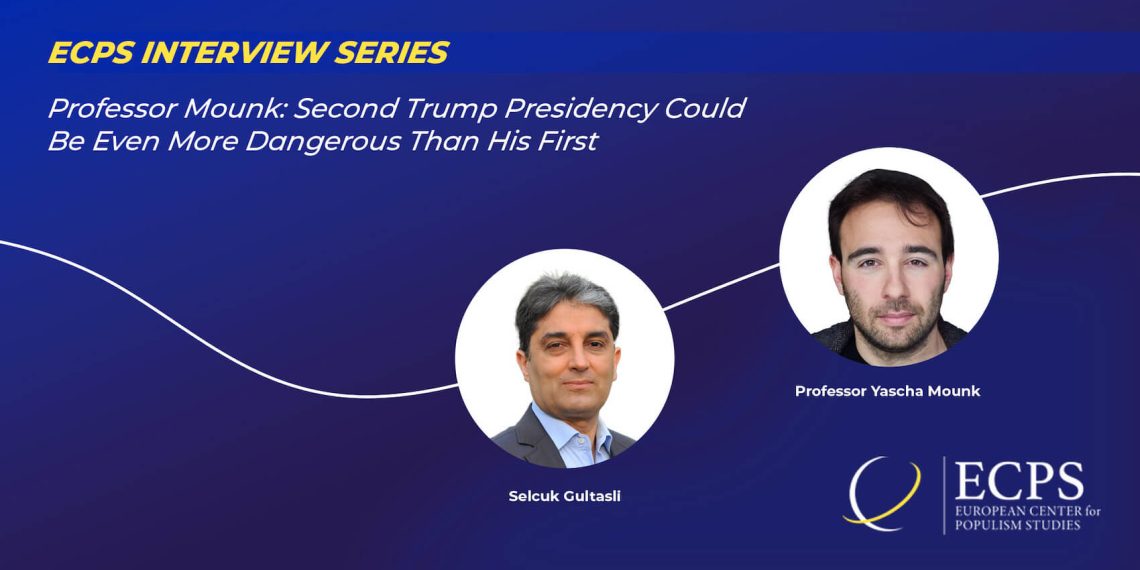Professor Yascha Mounk observes that many Americans perceive the Democratic Party as being out of sync with mainstream values and believe that Kamala Harris is too progressive, while fewer think Donald Trump is too conservative. He suggests that Democrats should consider making cultural concessions that align with public opinion, particularly where common sense prevails. Mounk presents two very different scenarios in the event of Trump’s victory on November 5. On one hand, he notes that Trump’s first term, though damaging and chaotic, was perhaps less consequential than some, including Mounk himself, feared in 2016. On the other hand, Mounk offers a sobering analysis of what a second Trump term could mean for the future of the US.
Interview by Selcuk Gultasli
In a comprehensive interview with the European Center for Populism Studies (ECPS) on Tuesday, Dr. Yascha Mounk, Professor of the Practice of International Affairs at Johns Hopkins University’s School of Advanced International Studies and founder of Persuasion—an online magazine dedicated to defending the values of free societies—delivers a compelling analysis of the rise of populism and its implications for the future of democracy. Professor Mounk identifies three key drivers that have contributed to the rise of populism in the United States: the stagnation of living standards for ordinary citizens, rapid cultural and demographic transformations, and the rise of the internet and social media. These factors, he argues, have collectively fueled a sense of disillusionment and alienation among significant segments of the population, creating fertile ground for populist leaders like Trump to thrive.
As the November 5, 2024, US presidential election approaches, the stakes have never been higher. With Donald Trump’s re-election campaign gaining momentum, Professor Mounk states that ‘there are two very different prognostications. On one hand, you could argue that Trump was in power for four years, which turned out to be damaging and chaotic, but perhaps less consequential than some of us, including myself, feared in 2016’. He also offers a sobering analysis of what a second Trump term could mean for the future of the United States. He reflects on the evolution of Trump’s political influence, noting that “Trump now has about a 45% chance, according to betting markets, of regaining power,” highlighting the tight race and the potential consequences of his victory. Touching on the potential consequences of a second Trump presidency, Professor Mounk warns that while Trump’s first term was damaging, his probable second term could be even more dangerous given his increased experience, a loyal base within the Republican Party and a desire for retribution against institutions he believes hindered his first administration. The risks to American democracy, Professor Mounk suggests, are substantial, and the outcome of the 2024 election could have long-lasting implications for the country’s political landscape.
Reflecting on the broader debate about the resilience of democracies in the face of populist threats Professor Mounk acknowledges the strengths that have allowed American democracy to endure, while he also cautions against complacency, noting that the challenges posed by populism are far from over. Mounk points out that Trump’s four years in office, while chaotic, were mitigated by the resilience of American institutions, including the federal system and the economy.
One of the central themes of the discussion in the interview is the impact of the changing demographic landscape on American politics. Professor Mounk notes that while immigration and demographic change are related, they are conceptually distinct phenomena. He argues that frustration over perceived loss of control—over borders and the cultural direction of the country—has been a significant driver of populist sentiment. This has been particularly evident in the case of Trump, whose appeal to voters is deeply rooted in cultural identity politics rather than purely economic concerns. Professor Mounk explains that Democrats had once banked on demographic shifts securing their electoral future, assuming that as the number of non-white voters increased, so too would their dominance. However, this assumption has not played out as expected. “The leftward drift of the Democratic Party has pushed many of these voters away,” Professor Mounk notes, underscoring the complex dynamics that have kept Trump competitive.
Professor Mounk also delves into the evolving media landscape, highlighting the profound shift from traditional broadcast networks to a more fragmented and polarized media environment dominated by social media, podcasts and independent platforms. He expresses concern over the term "misinformation" and how it has been used to suppress certain viewpoints, urging a more nuanced approach to the concept in public discourse. Professor Mounk’s insights provide a timely and critical perspective on the future of democracy in the United States and beyond.


